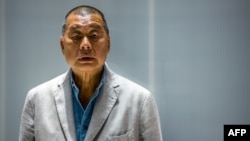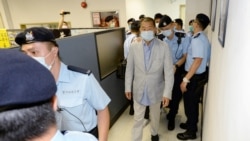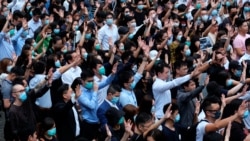On December 2, Jimmy Lai, the founder of Next Digital – parent company of Hong Kong’s largest pro-democracy newspaper, Apple Daily – was ordered jailed and denied bail for alleged fraud.
Lai, along with Next Digital’s chief executive officer and chief operations officer, are accused of using the company’s offices for purposes not stated in the lease. But while Lai’s two colleagues were released on bail, Lai was ordered to remain in custody until April 2021, because he supposedly presents a flight risk, according to public broadcaster RTHK.
Lai’s supporters and critics of the Hong Kong government say his arrest is part of an escalating campaign to silence its opponents.
The November incident was Lai’s fourth arrest this year. The first was in February, for “taking part in an unauthorized antigovernment march,” as the Guardian reported. In April, he was arrested for his role in 2019 Hong Kong protests. Four months later, under Hong Kong’s new security law, Lai was accused of colluding with foreign forces, arrested and released on bail.
Polygraph.info previously fact checked China’s Communist Party newspaper for falsely claiming that “[Lai] and his ilk want to be U.S. pawns in Hong Kong ... and dedicated to turning Hong Kong into a pivot. They are special allies of the U.S.”
Hong Kong’s police has held Lai’s passport since the beginning of this year, meaning he is unable to leave the country, Mark Simon, a former business aide of Lai, told the Washington Post. According to Simon, “the issue was an 'ongoing commercial dispute' that has been ‘criminalized' by the authorities.”
Claudia Mo, a former Hong Kong Democratic legislator, told Al Jazeera that the authorities’ actions were part of a “reign of fear” intended to undermine morale among government critics. And Antony Dapiran, a Hong Kong-based lawyer and commentator, tweeted that “charging this key political opponent with *fraud* for using office space for company secretarial services in breach of lease restrictions” was a classic case of “lawfare” – the term used to describe the selective use of legal tools to target political opponents of the Chinese government.
Lai was detained the same day three pro-democracy activists, Joshua Wong, Agnes Chow and Ivan Lam, pleaded guilty and were sentenced to prison for participating in the 2019 protests – a turn of events The Wall Street Journal editorial board opined was “no coincidence.”
Massive protests broke out in Hong Kong in 2019 following the introduction of an extradition bill that would have sent Hong Kong residents to mainland China for court trials. The bill was suspended in June 2019 and withdrawn in September of that year.
But since then, China stepped in “to ensure the city has a legal framework to deal with what it sees as serious challenges to its authority,” the BBC reported. At the end of June, Hong Kong promulgated a National Security Law targeting the crimes of secession, subversion, terrorism and collusion with foreign forces. Potential penalties include life in prison.
Since the new security law came into effect, the media has come under pressure. As the Los Angeles Times wrote, since Lai's arrest in August, "reporters and editors have been hiding their notes, protecting contacts on encrypted messaging apps, and contemplating how much jail time they could get for violating Hong Kong’s new national security law." In November, an RTHK reporter was arrested for a story on alleged police misconduct. Authorities argued that she illegally used a car registration search during her investigation, but fellow journalists said "her arrest is a scare tactic to discourage reporting," according to the BBC.
Lai’s newspaper, Apple Daily, which has consistently criticized Beijing, called the media crackdown “barbaric acts of red terror” and openly supported pro-democracy protests by inserting protest posters into its paper copies and highlighting the feats of protest leaders in its news reports.
Lai also continued to speak out, writing in a commentary for The New York Times in May that “[t]he Communist Party was always going to try to tame Hong Kong, but its latest efforts are something else.” He added: “I have always thought I might one day be sent to jail for my publications or for my calls for democracy in Hong Kong.”
On December 8, Lai was awarded a special prize during the 2020 Press Freedom Awards ceremony – for his newspaper's 2019 protest coverage and for daring to continue "to openly criticize the Chinese regime." The prize was accepted on his behalf by his son.







